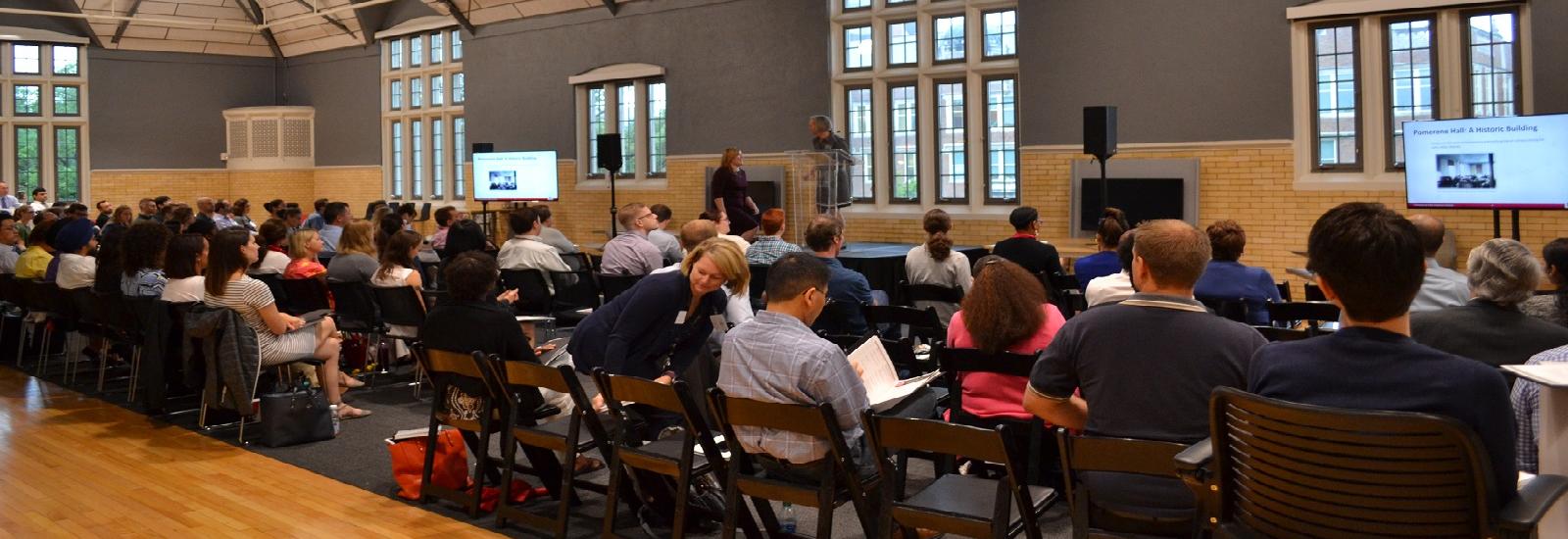TDAI Speaker recordings can be found below and on our YouTube Channel.
TDAI is grateful to these featured speakers.
2020-21 Speakers
“Digital Earth: The future of environmental governance in a wired world”

Dr. Karen Bakker is a Canada Research Chair and Professor at the University of British Columbia, with expertise in environmental governance, innovation, and digital technologies. She is the author of more than 100 academic publications and seven books. She is also a Pierre Elliott Trudeau Foundation Fellow and member of the Royal Society of Canada’s College of New Scholars, Artists and Scientists. She obtained her PhD from Oxford University (where she studied as a Rhodes Scholar) and her BASc (minor in Physics) from McMaster University.
Karen is a member of the Board of the International Institute for Sustainable Development, the Scientific Advisory Council of the Council of Canadian Academies, the Researcher Council of the New Digital Research Infrastructure Organization, and of the governing Council of the federal National Research Council. She regularly acts as an advisor to national and international organizations, including (currently) UNEP. Karen has also been the recipient of Canada's Top 40 under 40 Award (2011), the Annenberg Fellowship in Communication (from Stanford University's Center for Advanced Study in the Behavioral Sciences, 2015), and a Cox Visiting Professorship (Stanford School of Earth, Energy and Environmental Sciences, 2015). Her work was recognized by a SSHRC Impact Award in 2017.
Her involvement in the tech sector began in 2014, when she founded her first startup. After many first-timer mistakes and near-failures were redeemed by the acquisition of her most recent EdTech startup in 2017, she served as Strategy Director for Riipen, a Future of Work platform. She continues to serve as a coach and advisor to tech startups, particularly in the Conservation Tech and EdTech sectors.
Karen lives in Vancouver, Canada, with her husband, two daughters, and a cat named Luna. Under her pseudonym, Karen Le Billon, she writes books about kids, food, and culture. She cycles to work, and in her spare time can often be found paddleboarding, kayaking and rowing at one of Vancouver’s beaches.
Macarius Donneyong, TDAI Core Faculty, Assistant Professor, Pharmacy Practice and Science, College of Pharmacy; Division of Health Services Management and Policy, College of Public Health
"Measuring racial/ethnic disparities in medication adherence: Application of a multilevel health disparities framework"
The goal of this presentation is to demonstrate how to operationalize a multilevel health disparities framework to measure racial/ethnic disparities in medication adherence. Although both the National Academy of Medicine (NAM) and the National Institutes of Minority Health and Disparities (NIMHD) have proposed frameworks for measuring racial/ethnic health disparities in healthcare service utilization and outcomes, there is little guidance on how to operationalize these frameworks in research. I will discuss some of the challenges, propose some solutions and demonstrate how to operational these existing frameworks with a national healthcare database.
About Dr. Donneyong's research:
The population of patients with complex chronic diseases is rapidly increasing and driving up healthcare utilization and cost. It is therefore imperative for healthcare providers to provide high-quality, evidence-based healthcare services to patients to preserve their cognitive, physical, and functional independence and quality of life at an affordable cost. Hence, Dr. Donneyong’s major research objective is to generate high quality and timely data on the utilization, safety, and effectiveness of medications, medical devices, and procedures through the analyses of data collected from routine healthcare delivery settings. He is also interested in studying how to optimize pharmacotherapy outcomes by studying the interrelationships between pharmacotherapy and behavioral risk factors such as physical activity, diet, and the psychosocial determinants of health. Therefore, Dr. Donneyong’s research is largely driven by the analyses of large health administrative claims databases, electronic medical records, and patient registries through the application of cutting-edge quantitative methodologies in epidemiology, pharmacoepidemiology, biostatisitcs, and health services research.

Ayaz Hyder, TDAI Core Faculty, Assistant Professor, Environmental Health Sciences, College of Public Health
"Addressing racial/ethnic disparities in translational data analytics and modeling for public health practice: Examples from models of the reproductive health system and setting up a COVID-19 school surveillance system"
I will describe two current projects where we faced challenges in addressing racial/ethnic disparities. I will review two approaches (community based system dynamics and school-based surveillance) that my lab has applied with diverse stakeholders to solve pressing public health challenges at the county and state level in Ohio.
About Dr. Hyder's research:
Dr. Hyder’s research goal is to understand the role of multiple determinants of human health (e.g., social, environmental, biological) operating at multiple levels of organization (e.g., gene to society, space and time). He uses mathematical, statistical and computational approaches (e.g., systems science methods) to bring together theory, data and methods from multiple disciplines to build and validate predictive models of health. These models are further linked with health economics (e.g. cost-effectiveness analysis) to provide policy makers with tools to make better decisions.
Current areas of research include childhood asthma, the interplay of residential segregation and poverty traps on lifetime health trajectories, and environmental health disparities in preterm birth. He is also interested in questions about residential mobility, infectious diseases, and the role of place on health.
Brice Acree Memorial Lecture, presented in partnership with the Department of Political Science
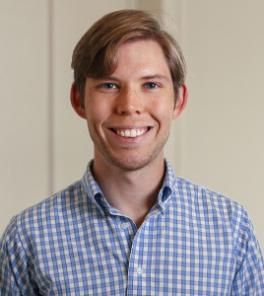
This lecture commemorates the passing of Political Science and TDAI faculty member, Brice Acree on November 11, 2019. Brice was an assistant professor who joined OSU as part of the Data Analytics Discovery Theme. An expert on Text and Data, Brice developed a new technique for measuring ideology in political speeches, which he further applied in co-authored work to consider how candidates presented their policies to a primary versus general electorate. At OSU, Brice inspired a significant cohort of collaborators and mentees among graduate and undergraduate students in the Department of Political Science and he is remembered for his wit and kindness and his investment in his students' research and careers.
This event will also include the presentation of a posthumous teaching award to the Acree family.
"The Prevalence of Fake News: 2016 to 2020"

How much "fake news"—ersatz content from seemingly legitimate publishers—was shared in 2016 and 2020, and by whom? This talk will walk through the tricky methodological challenges in counting suspect content, evaluate the patterns of sharing fake news, and discuss the implications for potential interventions to control exposure to misinformation.
Papers referenced in this talk:
Dr. David Lazer is a distinguished professor of political science and computer and information science at Northeastern University. He co-directs the NULab for Texts, Maps, and Networks. Prior to joining Northeastern University, Lazer was on the faculty at the Harvard Kennedy School (1998-2009).
His research focuses on the nexus of network science, computational social science, and collaborative intelligence. He founded the citizen science website Volunteer Science and the political visualization website VisPolics. His research has been published in journals such as Science, Proceedings of the National Academy of Science, the American Political Science Review, and the Administrative Science Quarterly. His work has received extensive media coverage by The New York Times, NPR, The Washington Post, The Wall Street Journal, and CBS Evening News.
Lazer serves as a board member for the International Network of Social Network Analysts, reviewing editor for Science, associate editor of Social Networks and Network Science, and on numerous other editorial boards and program committees. He is a founder of the Political Networks Section, as well as a founder and founding host of the Political Networks conference.

"AI, Big (or Bespoke) Data and Disasters"
Using big data and current technology is increasingly becoming part of the practice of emergency and disaster management. It is part of the climate change mitigation and adaptation conversation. With respect to marginalized populations, there are flaws in the way technologies are designed and how data is collected that have negative, disparate impacts on these groups. To ensure that the agencies and organizations that increasingly rely on a variety of data sources and typologies are able to leverage them effectively and equitably, we need to examine their evolution and the core issues around their ethical use.
Monica Sanders is an Associate Professor of Sociology and Criminal Justice at the University of Delaware. Previously, she created and taught a disaster law course on at the Washington and Lee University School of Law; and has had faculty appointments at Georgetown University, where she teaches an experiential learning course in Disaster Law and Policy as well as Hazard Economics.
Professor Sanders also served Senior Legal Advisor for International Response and Programs at the American Red Cross, focusing on international disaster response and humanitarian assistance principles. Previously, she was a Senior Committee Counsel for both the House of Representatives and Senate Committees on Homeland Security.
She holds advisory board and fellowship roles with Friends of Europe (an international security think tank), the Institute for Building Technology and Safety and the Internet Society of DC. Professor Sanders received her degrees from the University of Miami (B.S.), the Catholic University of America (JD), Harvard Law School Project on Negotiation (Cert.) and University College London (LL.M).

Dena Asta, TDAI Core Faculty, Assistant Professor, Statistics, College of Arts and Sciences
Dr. Asta’s research interests include network inference and non-parametric methods on non-Euclidean spaces. Network inference aims to give statistically rigorous methods of analyzing and comparing brain networks, collaboration networks, and other real-world networks. Non-parametric methods on non-Euclidean spaces adapts non-parametric methods of inference to data that naturally lives in spaces other than Euclidean space; such data for example arises in brain imaging, astrostatistics, and radar tracking.
“Statistical networks with underlying geometry” Graphs are naturally formed by sampling points from a manifold and connecting edges with some probability dependent on manifold distances. We survey some research, old and new, relating the geometry of the manifold with combinatorial properties of the sampled graphs. We then present some recent research on estimators of such random graphs actively exploiting their geometric origins.

Joseph Bayer, TDAI Core Faculty, Assistant Professor, School of Communication, College of Arts and Sciences
Dr. Bayer’s research centers on social media analytics, social network cognition, and mobile technologies. In particular, he studies how people mentally perceive, understand, and represent social networks and technologies. This work takes an interdisciplinary approach, integrating cognitive theories and computational methods from communication, psychology, sociology, and information sciences. By explaining the underlying cognition beneath contemporary technologies and personal networks, Dr. Bayer’s research has implications for social technology design, communication strategy, and personal well-being over the long term.
“Pairing Mobile Traces and Surveys to Measure Social Media Effects”
In this talk, I discuss the opportunities and obstacles associated with directly linking mobile traces (e.g., app logs, GPS) and mobile surveys (e.g., ESM, EMA) in study designs. Drawing on data from the OSU Daily Mobility Study, I present new results pertaining to the emotional effects of social media usage in everyday life. By testing how social media effects vary as a function of location and transportation mode, the study introduces a spatial approach for understanding the psychology of communication technologies. To that end, the talk showcases the potential of designing studies around “rich data” to clarify the contested literature on social media and well-being.
Dr. Bayer’s research centers on social media analytics, social network cognition, and mobile technologies. In particular, he studies how people mentally perceive, understand, and represent social networks and technologies. This work takes an interdisciplinary approach, integrating cognitive theories and computational methods from communication, psychology, sociology, and information sciences. By explaining the underlying cognition beneath contemporary technologies and personal networks, Dr. Bayer’s research has implications for social technology design, communication strategy, and personal well-being over the long term.
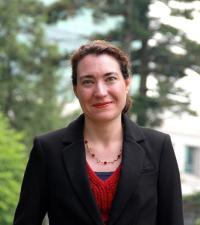
Cecile Viboud is a senior research scientist in the Division of International Epidemiology and Population Studies of the Fogarty International Center, National Institutes of Health, USA. Her research focuses on the epidemiology and transmission dynamics of acute viral infections, at the interface of public health and computational modeling. Her work has primarily concentrated on the epidemiology of respiratory viruses and pandemic influenza, but she has recently become interested in the potential of Big Data to strengthen infectious disease surveillance and forecasting approaches.
A native of France, she received an engineer degree in biomedical technologies from the University of Lyon (1998), a Master of Public Health (1999) and a PhD in Biomathematics (2003) from Pierre and Marie Curie University, Paris, France.
“Epidemiology and transmission dynamics of SARS-CoV-2 in the US, China and South Africa”
Abstract: We will discuss several population-level analyses documenting the burden and transmission dynamics of SARS-CoV-2 based on the data from the US, China and South Africa. Excess mortality and hospitalization studies will show the direct impacts of the pandemic on respiratory diseases and chronic conditions by geography and age group, which are in part undetected by official statistics. We will also begin to quantify some of the secondary impacts of COVID-19 interventions on unnatural deaths and circulation of other pathogens. We will contrast the burden of COVID-19 with that of past influenza pandemics. We will show how changes in contacts and mobility throughout 2020 have impacted SARS-CoV-2 transmission rates in the US. Finally, we will describe efforts to combine information from multiple transmission models and academic teams to project the long-term trajectory of COVID-19 and the impact of interventions.

Zhiqiang Lin, TDAI Core Faculty, Associate Professor, Computer Science and Engineering, College of Engineering
"Securing Data Analytics via Trusted Execution Environment”
Being able to securely process private data is of high demand today. In addition to differential privacy, using a trusted execution environment (TEE), an isolated environment using hardware, software, and cryptographic techniques, has increasingly become a practical approach for privacy computing. Prominent examples of TEEs include Intel SGX, AMD SEV, and ARM TrustZone. With TEEs, data can be stored securely (e.g., fully encrypted) but still can be computed directly over the raw data in an isolated environment to ensure both the integrity of the computation and the confidentiality of the data.
In this talk, Dr. Lin will present a line of research on how to develop abstractions, tools, and SDKs, to ease the SGX programming and data-analytics. In particular, he will talk about SGX-BigMatrix that supports vectorized computations and optimal matrix based operations over encrypted data using Intel SGX, SGX-Elide that enables enclave code confidentiality via dynamic updating, and finally Rust-SGX that allows programmers to develop memory safe SGX applications atop Rust programming language.
Bio: Dr. Zhiqiang Lin is an associate professor in the Department of Computer Science and Engineering, and a core TDAI faculty member at The Ohio State University. His research interest lies in systems and software security, and trusted computing (particularly trusted execution environments), with an emphasis on developing automated program analysis (e.g., binary analysis and reverse engineering techniques), system abstractions, and tools, and applying them to secure both the application programs including mobile apps and the underlying systems software such as OS kernels and hypervisors. Dr. Lin is a recipient of both NSF CAREER award and AFOSR YIP award. He received his Ph.D. in Computer Science from Purdue University in 2011.
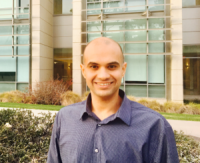
Raef Bassily, TDAI Core Faculty, Assistant Professor, Computer Science and Engineering, College of Engineering
“Harnessing Public Data in Privacy-Preserving Machine Learning”
One of the most salient features of our time is the dissemination of huge amounts of personal and sensitive data. Despite their enormous societal benefits, new powerful tools of machine learning pose real threats to personal privacy. Differential privacy has emerged as a sound theoretical approach to reason about privacy in a precise and quantifiable fashion, and has become the gold standard of privacy-preserving data analysis. It offers a rigorous algorithmic framework to tackle the hard challenge of learning about a population without learning about individuals.
Despite its remarkable success, differential privacy is a stringent condition that sometimes comes with various limitations leading to unacceptable accuracy guarantees in many machine learning problems. In this talk, I will present a more relaxed model of learning under differential privacy, where the learning algorithm has access to a limited amount of public data, in addition to its input private dataset. I will discuss algorithmic techniques we developed for this model and their formal accuracy guarantees. Our results show that, with a limited amount of public data, it is possible to attain the same level of accuracy attained by non-private algorithms, while providing strong privacy guarantees for the private dataset.
Bio: Raef Bassily is an assistant professor in the Department of Computer Science and Engineering, and a core TDAI faculty member at the Ohio State University. His research focuses on tackling current challenges in data analysis and machine learning especially those of direct impact on society. His recent research efforts are devoted to developing practical algorithms with formal privacy and utility guarantees for fundamental problems in machine learning and data analysis. His research employs tools and ideas from several fields such as learning theory, optimization, information theory, and statistics.

Rayid Ghani is a Distinguished Career Professor in the Machine Learning Department and the Heinz College of Information Systems and Public Policy at Carnegie Mellon University.
Rayid is a reformed computer scientist and wanna-be social scientist, but mostly just wants to increase the use of large-scale AI/Machine Learning/Data Science in solving large public policy and social challenges in a fair and equitable manner. Among other areas, Rayid works with governments and non-profits in policy areas such as health, criminal justice, education, public safety, economic development, and urban infrastructure. Rayid is also passionate about teaching practical data science and started the Data Science for Social Good Fellowship that trains computer scientists, statisticians, and social scientists from around the world to work on data science problems with social impact.
Before joining Carnegie Mellon University, Rayid was the Founding Director of the Center for Data Science & Public Policy, Research Associate Professor in Computer Science, and a Senior Fellow at the Harris School of Public Policy at the University of Chicago. Previously, Rayid was the Chief Scientist of the Obama 2012 Election Campaign where he focused on data, analytics, and technology to target and influence voters, donors, and volunteers. In his ample free time, Rayid obsesses over everything related to coffee and works with non-profits to help them with their data, analytics and digital efforts and strategy.
This event is co-hosted by the Battelle Center for Science, Engineering and Public Policy

View the video of Dr. Kalcic and Dr. Hood's talks
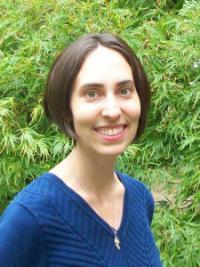
Margaret Kalcic, TDAI Core Faculty, Assistant Professor, Department of Food, Agricultural and Biological Engineering, College of Food, Agricultural, and Environmental Sciences, College of Engineering
“Watershed Modeling to Support Water Quality Management in Lake Erie”
Lake Erie has long been plagued by water quality problems, including harmful algal blooms in its western basin that limit the lake’s potential for recreation, fishing, and drinking water. The immense blooms are fueled by high nutrient loads coming from the lake’s tributaries. Most of these nutrients wash off farmland, where they were applied to fertilize crops. The lake’s watershed (the land contributing runoff to the lake) is binational, managed by three states and one province. These governments have agreed to reduce nutrient loads from their tributaries to a level that lake models show should prevent large algae blooms from occurring. The challenge is to determine and implement land-based solutions, such as agricultural conservation and management practices. My research group uses watershed models to link climate and land management to nutrient loads transported from the watershed to Lake Erie. In this talk I will present on some of our latest research on ensemble modeling to increase confidence in predictions. A diverse group of stakeholders was engaged throughout the research process, and the outcomes are intended to support stakeholders and managers working to improve water quality in western Lake Erie watersheds.
BIO: Margaret Kalcic’s research is in the area of watershed hydrology with a particular focus on water quality in agricultural regions. One of her main goals is to provide producers in the western Lake Erie watersheds, as well as their advisors, information that encourages adoption of appropriate conservation measures to tackle Lake Erie’s nutrient goals. This involves not only scientific and modeling challenges, but engaging stakeholders and working across disciplines in the social sciences, economics, and policy domains.

Jim Hood, TDAI Core Faculty, Assistant Professor, Department of Evolution, Ecology, and Organismal Biology; College of Arts and Sciences
“Do river phosphorus cycles constrain Lake Erie cyanobacterial blooms?”
In this talk, I will discuss recent and ongoing research focused on understanding the role that streams and rivers play in shaping the magnitude and bioavailability of phosphorus exports to Lake Erie. Phosphorus exports from the agriculture-dominated western Lake Erie watershed are primarily responsible for the harmful cyanobacteria blooms in western Lake Erie which have negatively impacted fisheries, tourism, and coastal communities. Decades of research shows that phosphorus cycling in streams and rivers can alter the magnitude and bioavailability of phosphorus exports to recipient ecosystems. Yet, there have been few attempts to extrapolate from in situ measurements in small tributaries, which are time and labor intensive, to the large spatial and temporal scales necessary to inform phosphorus management. I will describe our efforts to address two challenges related to this scaling. First, while high flow events (i.e., floods) deliver the majority of P to downstream ecosystems, we know little about phosphorus cycling during these events. Second, scaling up temporally and spatially heterogeneous in situ measurements of P cycling requires novel approaches. This talk highlights the potential of combining in situ sampling with environmental sensor and other time series data to gain insight into ecological processes at large temporal and spatial scales.
BIO: Professor Hood is an ecologist who studies the patterns and fluxes of nutrients and energy in freshwater systems. His research broadly focuses on 1) how nutrient supply and temperature influence the growth and nutrient balance of organisms, and, 2) how these individual responses sum to shape ecosystem processes.
View the video of Dr. Caceres' talk
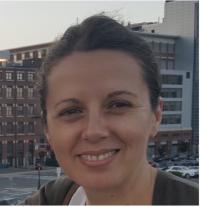
“Network-informed intervention strategies for pandemic response”
In this talk, I will highlight the critical role complex networks play in designing effective pandemic control strategies. I will present an end-to-end decision-making system that integrates network effects and characteristics, both at the disease modeling step and at the planning step.
We leverage a Monte Carlo Tree Search algorithm to design adaptive intervention strategies over mobility networks and network-based SEIR dynamics. Our system can capture diverse characteristics of COVID-19 disease evolution, from super-spreader events to recurrent surges.
Through our system, we can explore a variety of what-if scenarios and characterize controllability patterns across different initial conditions and geographical areas. Our approach identifies targeted and localized intervention strategies that control the spread while minimizing intervention cost. We compare our approach to several baseline planning heuristics and make precise the added benefit of leveraging network-based, adaptive planning.
BIO: Dr. Rajmonda S. Caceres is a senior research scientist and technical lead in the Artificial Intelligence Technology Group at MIT Lincoln Laboratory. Her research is at the intersection of network science, machine learning and data mining. Rajmonda has contributed to a variety of application areas including network fusion and anomaly detection in cyber and social networks, AI for scientific discovery of novel biological sensors and materials and task-driven learning over networks. Her current work focuses on methods for representation learning of graph and sequential data to support antibody design, as well as network planning for pandemic response and control. In 2020 Rajmonda led the MIT Lincoln Laboratory AI educational programs and outreach and was a co-Principal Investigator of the US Air Force-MIT Accelerator AI Education research program.
This event is co-hosted by the Battelle Center for Science, Engineering and Public Policy

View the video of Dr. Chen's talk

Elizabeth S. Chen, PhD, FACMI is Interim Director of the Brown Center for Biomedical Informatics (BCBI), Associate Professor of Medical Science, and Associate Professor of Health Services, Policy & Practice at Brown University. Dr. Chen's research involves involves leveraging electronic health data along with health information and communications technology to support biomedical discovery and healthcare delivery. Specific research interests include clinical documentation, clinical decision support, health information needs, standards and interoperability, natural language processing (NLP), and data mining and machine learning.
Within BCBI, Dr. Chen leads the Clinical Informatics Innovation and Implementation (CI3) Laboratory that has a three-fold mission to: (1) innovate use of the Electronic Health Record (EHR) for primary (e.g., patient care) and secondary (e.g., research, quality, and public health) purposes, (2) implement digital solutions within operational clinical and research systems, and (3) inspire the next generation of clinical informaticians. Her current research projects are focused on using data, technology, and computational approaches for improving mental health (mental health informatics) and child health (pediatric informatics).
As Director of the Advance-CTR Biomedical Informatics and Cyberinfrastructure Enhancement Core, Dr. Chen is actively involved with initiatives for making EHR data accessible and usable for the clinical and translational research community in Rhode Island. She is also contributing as a Faculty Scholar to the research and evaluation infrastructure for supporting work on a broad range of health initiatives within the Hassenfeld Child Health Innovation Institute.
Dr. Chen received a BS in Computer Science from Tufts University and PhD in Biomedical Informatics from Columbia University. Prior to joining Brown University in July 2015, she held appointments at Columbia University, Partners HealthCare/Brigham and Women’s Hospital/Harvard Medical School, and the University of Vermont.

